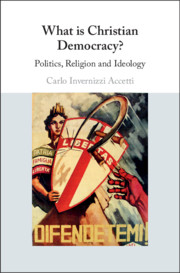Book contents
- What Is Christian Democracy?
- What Is Christian Democracy?
- Copyright page
- Dedication
- Contents
- Acknowledgments
- Abbreviations
- Introduction
- Part I Conceptual Building Blocks of the Christian Democratic Ideology
- 1 Anti-Materialism
- 2 Personalism
- 3 Popularism
- 4 Subsidiarity
- 5 Social Capitalism
- 6 Christian Inspiration
- Part II History and Future Prospects of Christian Democracy as a Political Phenomenon
- Conclusion
- Bibliography
- Index
2 - Personalism
Neo-Thomist Metaphysics and Human Rights
from Part I - Conceptual Building Blocks of the Christian Democratic Ideology
Published online by Cambridge University Press: 04 September 2019
- What Is Christian Democracy?
- What Is Christian Democracy?
- Copyright page
- Dedication
- Contents
- Acknowledgments
- Abbreviations
- Introduction
- Part I Conceptual Building Blocks of the Christian Democratic Ideology
- 1 Anti-Materialism
- 2 Personalism
- 3 Popularism
- 4 Subsidiarity
- 5 Social Capitalism
- 6 Christian Inspiration
- Part II History and Future Prospects of Christian Democracy as a Political Phenomenon
- Conclusion
- Bibliography
- Index
Summary
This chapter explores the basic metaphysical premises on which the Christian Democratic ideology is based, focusing in particular on its conception of human nature. It does so through an engagement with the meaning this ideological tradition has historically assigned to the concept of the human “person.”
Keywords
- Type
- Chapter
- Information
- What is Christian Democracy?Politics, Religion and Ideology, pp. 53 - 79Publisher: Cambridge University PressPrint publication year: 2019
- 1
- Cited by

